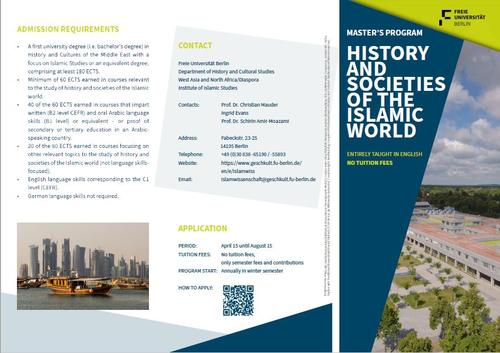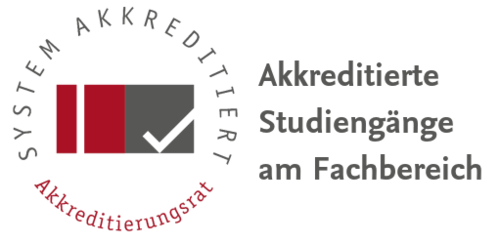Master "History and Societies of the Islamic World"
Admission Requirements
For admission to the master’s program, applicants must fulfill the following requirements:
- A first university degree (e.g., a bachelor’s degree) comprising at least 180 credit points (ECTS). A minimum of 60 ECTS must have been earned in courses relevant to the study of history and societies of the Islamic world. Of these 60 ECTS, at least 40 ECTS must have been earned in courses that impart written Arabic language skills up to and including the B2 level of the Common European Framework of Reference for Languages (CEFR) and oral Arabic language skills at the level B1 or an equivalent. At least 20 ECTS of the requirement must have been earned in courses focusing on other (i.e., not language skills-focused) topics relevant to the study of history and societies of the Islamic world. The Arabic language requirement can also be fulfilled in other ways, for example by providing proof that the applicant has completed secondary or tertiary education in an Arabic-speaking country. In this case, the required 60 ECTS must have been earned in courses focusing on other (i.e., not language skills-focused) topics relevant to the study of history and societies of the Islamic world.
- Applicants who have not completed a university degree at an institution where coursework was conducted mainly in English must demonstrate English language skills corresponding to the C1 level (CEFR).
- German language skills are not required.
More information on admission criteria can be found in the Admissions Regulations for the Master's Program History and Societies of the Islamic World (pages 207-231)
Please note that only the German versions of these documents are legally binding. This translation is intended for the convenience of the non-German-reading public and is for informational purposes only.
Fees
Students do not pay any tuition fees, the university only charges semester fees and contributions each semester.
Contents
History and Societies of the Islamic World is a research-oriented master’s program at the Department of History and Cultural Studies with a focus on history, culture, religion, and the social sciences. It is a consecutive master’s program taught entirely in English that requires a bachelor’s degree in History and Cultures of the Middle East with a focus on Islamic Studies, or an equivalent degree in a closely related subject.
The program focuses on the history, politics, religions, cultures, knowledge formations, and normativities of Islamic societies from the beginnings of Islam to the present. The regional focus lies on West Asia and North Africa as well as on Europe, with special attention to global perspectives and interconnections. The master’s program offers an overview of the current state of research and central debates in the study of the history and societies of the Islamic world and trains students in various research approaches and methodologies. The inter- and transdisciplinary area of the program provides students with the opportunity to specialize and deepen their professional focus. The principles and techniques of academic work and good scholarly practices are taught, practiced, and applied.
Unique features of the program in the German academic context include the regional profile area “Islam in Europe” and a special emphasis on theory and methodology in the study of the Islamic world. Theoretical and methodological topics and approaches include gender dimensions in various contexts as well as constructions of difference and alterity; postcolonial perspectives; critique of racism; knowledge production and power; the interaction of law, religion, and politics; systems of meaning-making; linguistic and social constructions of reality; power asymmetries and dependencies; conceptual history and semantic fields; religion and secularity; heritagization; popular and consumer culture; urban studies; and insider and outsider perspectives among Muslims and non-Muslims.
The strong research orientation of the master’s program results in a close linkage between the courses offered and the research priorities of the Institute of Islamic Studies. Through research-based learning, students are encouraged to carry out independent research projects – for example through guided field research, interview-based research, philological source analysis with a focus on unedited manuscripts, the systematic recording and analysis of current Arabic knowledge production, digital humanities, approaches to material culture, or in globally oriented conceptual studies drawing on multiple types of sources. Additionally, students deepen their knowledge of Arabic through reading courses dealing with Arabic primary sources of various types and genres in the core focal area of the program.
Students in their second or third semester are encouraged to study abroad, choosing among various partner universities. Professional internships are also suitable for a stay abroad and can be included in the program as part of the trans- and interdisciplinary area. Students also become familiar with international scholars through guest lectures and presentations that supplement the regular courses.
Why Study at Freie Universität Berlin?
The Institute of Islamic Studies at Freie Universität Berlin is integrated into a unique network of academic and cultural institutions related to the Islamic world, including the Museum für islamische Kunst, the Staatsbibliothek zu Berlin – Preußischer Kulturbesitz with its Oriental Department (housing the largest collection of Arabic manuscripts in Germany), the Haus der Kulturen der Welt, and other institutions. Moreover, there is a broad variety of opportunities for exchange and collaboration with neighboring academic institutions. These include the Leibniz-Zentrum Moderner Orient, the Forum Transregionale Studien, the Berlin-Brandenburg Academy of Sciences and Humanities, the Institute for Asian and African Studies and the Berlin Institute for Islamic Theology at Humboldt-Universität zu Berlin, as well as other institutes at Freie Universität Berlin, including the Institutes of Arabic and Semitic Studies, Iranian Studies, Jewish Studies, and Ottoman and Turkish Studies.
Another unique asset of the university is the internationally highly renowned Berlin Graduate School Muslim Cultures and Societies, where the Institute of Islamic Studies plays a leading role. The school provides opportunities for further academic qualification to particularly successful graduates of the master’s program.
Last but not least, as an international and cosmopolitan European capital with a large Muslim population and numerous Islamic institutions and organizations, Berlin offers excellent opportunities especially for the focus area “Islam in Europe.”
Basic Information
1st semester admissions: Unrestricted admission
Admission for higher semesters: Unrestricted admission
Program start: Winter semester / Summer semester
Language: English
Degree: Master of Arts (M.A.)
Duration: 4 semesters
Structure
The Master's program is divided into three components, one of which is the master’s thesis. The other two components are each composed of several modules which, in turn, often comprise two courses.
a) Core Component
The core component consists of the common mandatory curriculum and the elective mandatory curriculum.
The common mandatory curriculum contains the following modules:
1) Islamic History I
2) Islamic History II
3) Culture, Knowledge, and Religion in Muslim Societies
4) Theory and Methodology: What is Islam?
5) Academic Skills and Tools
In the elective mandatory curriculum, students can choose between modules that focus either on Islam in Europe or on West Asia and North Africa. The following modules need to be completed:
1) Research Colloquium – West Asia and North Africa OR Research Colloquium – Islam in Europe
2) Politics and Society in West Asia and North Africa OR Politics and Society – Islam in Europe
3) Normative Orders in Muslim Societies OR Normative Orders and Religious Plurality in Europe
b) Trans- and Interdisciplinary Component
Students are encouraged to take courses in a language relevant to their field of study, for example Turkish, Hebrew, or Persian. Alternatively, or in addition, they can complete an occupational internship or take courses in disciplines focusing on different regions, for example within Arabic Studies, Chinese Studies, Iranian Studies, Japanese Studies, Jewish Studies, Ottoman and Turkish Studies, and Semitic Studies, and/or disciplines working with pertinent theories and methods, such as History or Religious Studies.
c) Master’s Thesis
The master’s thesis is intended to demonstrate that students are able to work independently on a question in the field of history and societies of the Islamic world, to present the results in an appropriate manner, to contextualize them in a scholarly perspective, and to document them.
For more detailed information on the structure, content, and modules of the program, students are asked to refer to the study and examination regulations, especially paragraphs 3, 7, and 9.
Career Opportunities
Program graduates acquire advanced subject-specific as well as theoretical and methodological skills that prepare them for work in different professional fields, particularly within institutions and organizations that deal with Islam or Muslim communities or with aspects of interculturality. Relevant areas include international organizations, non-governmental organizations, media, publishing, museums and specialist libraries, adult and further education, public authorities and agencies, political consulting, migration, and tourism. In addition, the program also qualifies its graduates to pursue doctoral studies.
Application
Applications do not go through the Institute for Islamic Studies, but through the (central) Application and Admission Department. Applications are possible for the winter and summer semester. The majority of places are allocated according to final grade. Despite the steadily increasing number of applications, all applicants who met the formal criteria have been accepted so far.
Deadlines
Application periods
Winter semester: 15 April to 15 July
Summer semester: 1 December to 15 January
Further questions
If you have any further questions, please feel free to contact our Master's Program representative.
Current Study & Admission Regulations
Schlagwörter
- master, islamic world, history, societies



